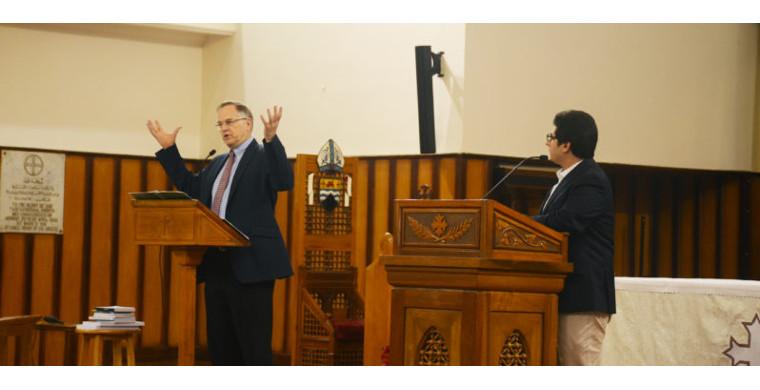The Bible and the Reformation - Chris Wright
Diocese of Egypt
January 30, 2017
Visiting Egypt for the 500th anniversary of the European Reformation, Chris Wright aptly taught on Biblical preaching. And in his public lecture to nearly 300 people on January 26, he focused on the centrality of the Bible for all reformation.
"Ecclesia semper reformanda," Wright said. "The church must be continually under reformation, renewed by the Bible."
Bishop Mouneer Hanna Anis of Egypt invited Wright to All Saint's Cathedral in Cairo to train Anglican clergy how to minister the Word of God in their churches. In a series of four presentations he emphasized godly preaching must be both Biblically faithful and culturally relevant.
Wright is the international ministries director of the Langham Partnership, dedicated to educating pastors toward theological maturity. The ministry began under John Stott, rector of All Souls Church at Langham Place. Wright has a PhD in Old Testament ethics from Cambridge University, and encouraged the clergy not to neglect this great treasure.
"The Old Testament was the Bible of Jesus," he said. "And if we neglect it we deprive our congregations of a great deal of depth about who Jesus is."
Wright is the author of more than 15 books, and his Knowing Jesus through the Old Testament is one of ten that have been translated into Arabic.
And in his translated public lecture, he expounded on how Ezra and Nehemiah set a reformation pattern later followed by Luther, Calvin, and other Protestant pioneers.
Expounding on Nehemiah 8-10, Wright outlined four essential movements. The first focuses on the ears, as the Word of God is read and listened to. As Ezra and Nehemiah brought together the whole people, so did Luther make the Bible accessible for the masses. And not just the masses, but political and spiritual leaders also come under its authority.
The second movement focuses on the mind, as the Word of God is translated and taught. As Ezra and Nehemiah helped now-Aramaic speaking Jews understand the original Hebrew, so also Luther translated the New Testament from Greek into the German vernacular. Both also ensured that those they instructed were equipped to teach others.
The third movement focuses on the heart, as the Word of God produces weeping and rejoicing. Ezra and Nehemiah led the people into an understanding first of their sinfulness before God, but also in realization he is their gracious redeemer. Similarly did Luther guide Germans in knowledge of judgment and grace, and provided also a wealth of hymns and liturgy for communal response in praise.
The fourth movement focuses on the hands, as the Word of God prompts finding and doing. Ezra, Nehemiah, and Luther were purposeful students of the scripture, engaging it far beyond the duty of ritual. And as Luther would rediscover that though salvation is through faith alone, he and the Old Testament reformers insisted it is a faith that never stays alone. True faith produces the fruit of transformation as God's commands are put into practice.
These movements are an essential part of Biblical preaching, as Wright made clear in his seminar lectures as well. In addition to the Anglican Alexandria School of Theology, Bishop Mouneer Anis invited also the Orthodox, Catholic, and Evangelical seminaries to participate. Though expecting around 60 people, 135 attended, including the Archbishop of Sudan and three additional Sudanese bishops.
To all he gave the same message, as relevant in Europe 500 years ago as it is today.
"As heirs of the Reformation," said Wright, "we must search the scriptures together and respond with all sincerity and joy."
END














